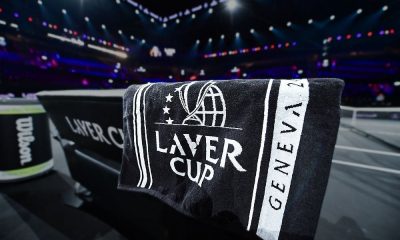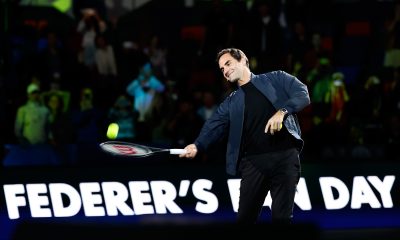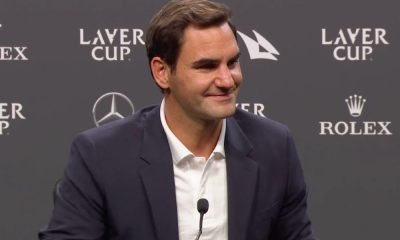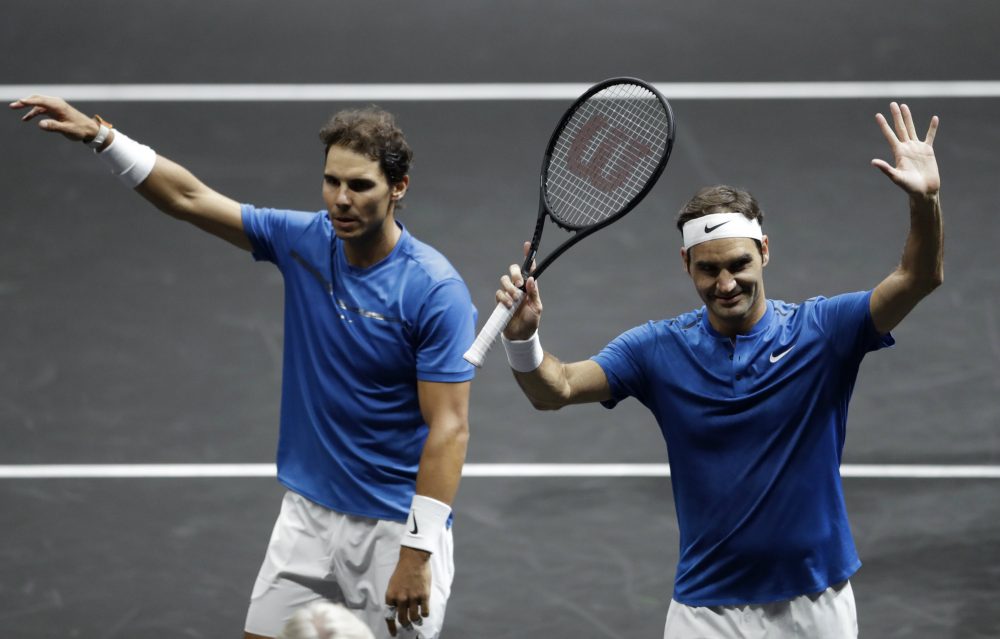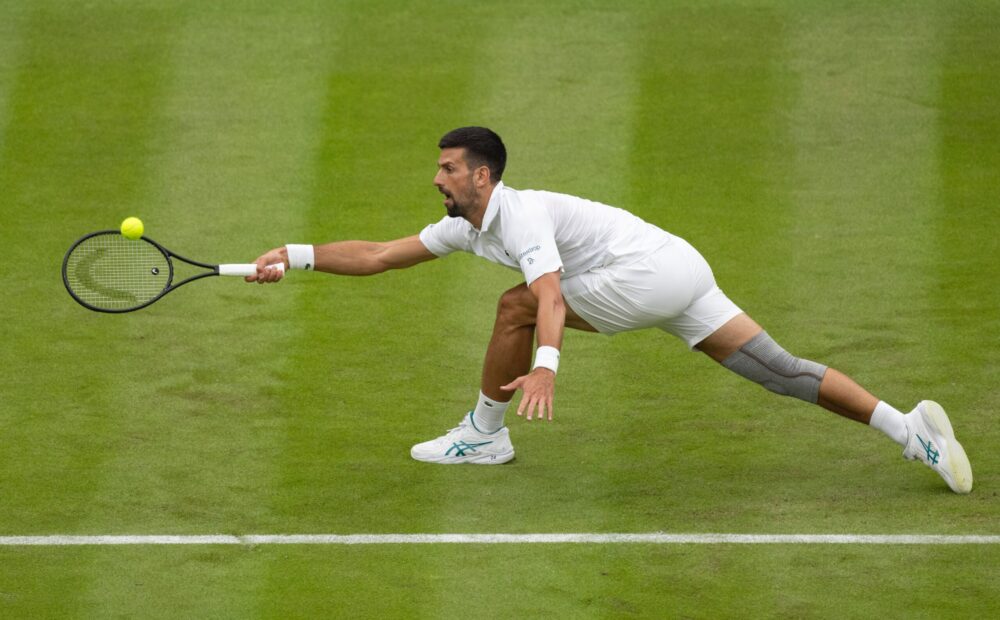TENNIS AUSTRALIAN OPEN – 19th of January 2015. R. Federer d. Y.Lu 6-4, 6-2, 7-5. An interview with Roger Federer
Q. Number 1001. Did you ever think you’d get there after you gotten 1000?
ROGER FEDERER: Yeah, I was hoping it would happen in Australia. I’m very pleased to make this one here tonight. You know, winning first round, it’s always a bit of a relief. I thought I played good. So it was nice to get 1001 here now tonight. We’re not going to talk about this every single match now, right? Let’s just keep it to this one (smiling).
Q. Do you think personality-wise it lends well to succeed for a player, say, if they’re outgoing on court it’s easier to face a pressure point, where someone who is introverted might have to work a little bit harder to succeed?
ROGER FEDERER: Good question. I’m not sure. You would think an introvert is not ready to take huge risks, but then again he might be very thoughtful and play very well-constructed points, won’t go for the silly shot. So I guess it really depends what kind of game you have. But I like the idea when you’re young and you’re fearless, you give it a shot and just go big and take it away from your opponent. That’s kind of how I felt, how I did it sometimes. Yeah but, you know, it didn’t always work. If you look, Lleyton, who wasn’t quite like that, he was more constructive in his points. He had much more success early on. So I don’t know.
Q. You’d class yourself as an intro or extrovert?
ROGER FEDERER: Extrovert probably I’d say.
Q. One year ago you said in the press conference prior to the tournament you came here with the back hurting to some point. This year you suffered some hurt in the back in the World Tour Finals in London. How did you manage to keep the pain at bay from a medical standpoint, the treatment you received, and so on?
ROGER FEDERER: After London?
Q. Yes.
ROGER FEDERER: And Davis Cup?
Q. Yes.
ROGER FEDERER: I had the doctor take a train from Lille Saturday night after the Stan match. I called him up and asked him if he could come see me. When I woke up he was there, which was great because it’s not far away. I hardly could get out of bed. Yeah, he had a look at me. I don’t know, can’t even run so can’t play clearly. I was like, Are you sure? Can’t we wait? He was like, I don’t know. You can’t run so you can’t play. So, anyway, number one, what we did was just let it heal, just do basically nothing except some very minor treatment just so it relaxes the most. It took two, two and a half days, three days until I could run again. And then clearly I was taking medication, heavy ones. Just got back in time. Basically Wednesday night when I went for a hit in Lille, that was the first time I felt like in that afternoon I could run basically. So that’s when I decided, If you can run, you can play. That’s my feeling. And I was happy that I somehow managed to play.
Q. I’m sure you’re well aware what happened to the Swiss franc the other day.
ROGER FEDERER: Yes, I am very well aware.
Q. What do you make of it? How does it affect you?
ROGER FEDERER: Does it mean I’ve got to win now (smiling)? Yeah, I mean, clearly, I don’t know, it definitely had a big impact all around the world, right? Yeah, Switzerland’s an interesting place. It’s small but quite powerful in some ways. Clearly it had an impact on me, too, no doubt about it. Things were going up all the time, so it’s normal have it reset. But the way it was done, maybe there were some question marks behind that because nobody saw it coming. I’m not the expert, so I don’t know exactly what you want me to tell you. Yeah, I guess for export or tourism it’s not ideal, but we’ll see how we’ll adjust to it now. Still think it’s a wonderful place to visit, so please come.
Q. Talk about risk taking in tennis. Is that a skill in itself, to know what to go for? Do you enjoy risk taking? Does it sometimes get a little boring when there aren’t any challenges or risk-taking situations?
ROGER FEDERER: Yeah, I think the most important thing in taking risks is that you actually believe in what you’re trying to do, that you’re 100% committed; 80% commitment is not enough. As you’re running up to the ball or trying to take the ball early, if you have a little bit of doubt that it’s not the right play, it’s funny enough, you’ll fail every single time. You just have to believe and visualize beforehand what’s going to happen. You see the play happening in your mind just before you hit it, and then you have the best chance of making it work. I think that commitment with the risk taking is the right one, and then knowing of what score you’re going to take the risk. Is it at Love-30? 30-All? Love-30? 40-Love? Love-40? It’s a totally different ballgame. What the best players usually do is they play the score very well. That’s something that comes with experience, but I also will experience sometimes I feel you start to play safer or the percentages more. That can become a bit boring. I always try to keep a young mind because I feel my game needs that risk taking, that committed play. Clearly when I’m confident, I can do it much easier.
Q. Novak’s forehand match point shot against you was possibly the greatest risk shot against you. What was one or two of your greatest successful high-risk shots?
ROGER FEDERER: I have no idea. Zero idea. I played too many points and so many times I have had to take a big chance and guessed the right way, and I did. Just felt it. Maybe match point against Sampras. Felt like he was going to slide it wide. I was just waiting there. I believe that clearly he was going to go T with an ace for sure. I gave him that and leaned the other way. Maybe that one sticks out.
Q. You may remember that article from David Foster Wallace years ago in the New York Times where described you as a religious experience, and then I read, a human beings reconciliation with the fact of having a body. What do you think? Do you recognize yourself? An exaggeration?
ROGER FEDERER: Just a slight exaggeration (laughter). But I guess in sports we have a tendency to — there’s no end. You know, it’s just so unbelievable sometimes, like it’s never been seen before. So I’ve been through this entire phase where I got so many compliments, you just thought, Wow, this is the best feeling in the world. But very quickly you get the feeling as well that not everything’s so great sometimes when you don’t play very well. I’ve been on both sides. That’s why I have no problem accepting criticism, because I’ve gotten so many compliments over the years. It’s part of the game. But clearly some unbelievable pieces have been written about me, about tennis, about other players. It’s interesting to read them. Sometimes just slightly exaggerated, but everybody can judge that the way they want.

 Hot Topics3 days ago
Hot Topics3 days ago
 Latest news3 days ago
Latest news3 days ago
 Hot Topics2 days ago
Hot Topics2 days ago
 Hot Topics3 days ago
Hot Topics3 days ago
 Focus2 days ago
Focus2 days ago
 Focus2 days ago
Focus2 days ago
 Focus3 days ago
Focus3 days ago
 Hot Topics2 days ago
Hot Topics2 days ago



